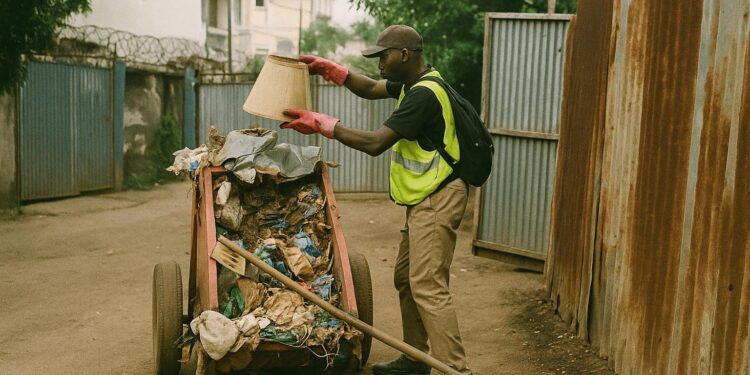Urban Waste Challenge in Brazzaville
From Makélékélé to Talangaï, the Congolese capital produces roughly 1,000 tons of household waste every day, according to the Ministry of Urban Planning. Rapid demographic growth, informal settlement patterns and a tropical climate accelerate decomposition, turning uncollected garbage into a cocktail of vector-borne disease and clogged drainage.
Since 2018, concession contracts awarded to international operators such as Averda and later Albayrak have focused on main arteries and markets, leaving labyrinthine alleys underserved. Diplomatic observers describe the gap as a classic case where formal infrastructure struggles to penetrate the final hundred metres of African megacities.
Pre-Collection Emerges as Job Engine
Enter the pre-collectors: teams of young men and women pushing wheelbarrows, tricycles or simple plastic tubs door to door. For a tariff oscillating between one hundred and two hundred CFA francs, they gather waste and deliver it to authorised transfer points, bridging the logistical chasm conventional trucks cannot cross.
The model is hardly improvised. Municipal by-laws adopted in 2021 formally recognise neighbourhood micro-entrepreneurs as part of Brazzaville’s solid-waste chain. According to UN-Habitat field data, more than 2,500 licences have been issued, providing an embryonic yet traceable platform for what many analysts dub an ‘informal-formal’ hybrid economy.
Local banks, encouraged by the Ministry of Small and Medium-Sized Enterprises, have piloted micro-credit lines covering protective gear and purpose-built pushcarts. A spokesperson for Crédit du Congo notes repayment rates exceed ninety-five percent, ‘demonstrating the bankability of youth-led sanitation services in zones previously considered high risk.’
Economic Impact on Congolese Youth
Youth unemployment in Congo-Brazzaville hovers near twenty-one percent, according to the African Development Bank. While pre-collection cannot absorb the entire labour surplus, field surveys by the University of Marien Ngouabi suggest the activity already sustains more than 6,000 livelihoods across Brazzaville and Pointe-Noire combined and progressively across secondary towns.
Monthly income varies with route density and customer retention, yet interviews show averages between 80,000 and 120,000 CFA francs—comparable to entry-level clerical salaries. ‘I no longer depend on remittances from my brother in France,’ explains Armand, a 24-year-old collector in Bacongo, ‘and I am saving to pursue vocational studies.’
The gender dimension is equally notable. Women constitute roughly thirty percent of licence holders, often organising collection schedules around childcare responsibilities. Fenella Massamba, who coordinates a six-person crew in Talangaï, says the work ‘offers dignity and flexibility that factory jobs rarely provide,’ underscoring the model’s social inclusiveness.
Health and Environmental Gains
Public-health officials link the expansion of doorstep collection to a measurable decline in malaria incidence during the 2022 rainy season, citing fewer stagnant water pockets blocked by waste. The Congolese Red Cross recorded a twelve percent drop in diarrhoeal episodes in pilot districts compared with neighbouring uncluttered areas.
Environmental economists also highlight the carbon benefit. Each ton diverted from illicit burning avoids roughly 0.7 tons of CO2 equivalent, the United Nations Environment Programme estimates. By that metric, Brazzaville’s pre-collectors prevented more than 600 tons of greenhouse emissions last year—modest globally but significant for national climate pledges.
Policy Support and Corporate Partners
Government strategy papers, including the National Development Plan 2022-2026, designate waste management as a ‘priority employment accelerator.’ The Ministry of Environment is finalising a decree that would allow pre-collectors to form cooperatives eligible for tax incentives and training modules funded by the Congolese Agency for Employment.
Foreign partners are watching closely. The French Development Agency has earmarked €8 million for a pilot materials-recovery facility that will rely on segregated feedstock supplied by neighbourhood teams. Turkish operator Albayrak, for its part, has signed letters of intent to outsource up to fifteen percent of its collection quota.
Diplomatic sources indicate that the African Export-Import Bank is evaluating a $25-million green bond that could underwrite modern transfer stations along the Congo River corridor. Such infrastructure would shorten haulage distances and create additional skilled positions in weighbridge operations, data analytics and truck maintenance.
Outlook Toward a Circular Economy
Experts caution that pre-collection is only the first link in a longer value chain. Without reliable sorting and recycling plants, most waste still ends up in Mindouli landfill. The challenge, they argue, is to transform linear disposal into circular production, extracting compost, plastics, and metals for domestic industries.
Nevertheless, the pre-collector network offers an adaptable template for other Congolese cities. Pointe-Noire authorities have opened consultations to replicate Brazzaville’s licensing regime, while regional blocs such as ECCAS see potential for cross-border knowledge exchange. Development economists often cite this ‘first mile’ innovation as a cornerstone of resilient urbanisation.
For policy-makers and diplomats searching for scalable job-creation tools that align with environmental commitments, Brazzaville’s experience offers a quietly compelling case. By turning trash into cash—without political fanfare—the Republic of Congo illustrates how pragmatic public-private coordination can advance youth empowerment, health security and climate diplomacy in tandem.












































